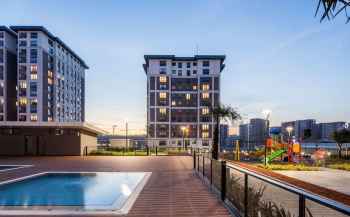Real estate gets sick and does not die. It is one of the most widespread and well-known real estate rules, and it carries a lot of meanings and connotations, especially in Turkey, so we liked to explain this important rule to everyone who wants to invest in real estate in Turkey, and everyone who is looking for an opportunity to own property in Turkey.
In this article, we will learn when real estate gets sick in Turkey? What are the causes that hinder your benefit from the property? We will also discuss the specifics of Turkey and the percentage of application of the rule "The real estate gets sick and does not die in Turkey."
A number of indispensable tips and directions for you... Read on.
The meaning of the real estate is sick and does not die
This phrase is universal and is widely used by major real estate investors, not only in Turkey, and it means:
that real estate may be subjected to stagnation, "get sick" by the passage of a certain emergency crisis, as the percentage of demand for real estate purchase in a country or region may decrease due to a crisis.
The duration of this stagnation varies according to the factor causing it, and the country in which this stagnation occurred.
Some countries, such as Turkey, recover easily from the impact of transient crises on their economy and the real estate sector in particular, and this has been proven with certainty more than once.
As for what is meant that real estate "does not die", it is that it preserves the long-term development of capital and ensures that its value does not lose, Especially when real estate investment is measured against other types of investment and the impact of crises on each of them.
In the science of financial investment, investing in real estate is the best form of investment and the farthest investment from loss, and it is the safe wallet for money, so what if this investment is in real estate in Turkey?
When does real estate get sick?
Yes, we said that the real estate gets sick and does not die, but what are the causes of drug disease? Or the stagnation of the real estate market in a more accurate sense...
In short: crises are the ones that generate an adverse reaction to the real estate market in any country, and among the crises that have a direct impact on real estate are:
Internal political crises
The crises that afflict countries at the political level negatively affect the real estate market in this country, so the sale and purchase of real estate may stop due to political vacancy, or the existence of a specific crisis, or turmoil between political parties within the country,
Likewise, the weakness of the structure of the political system in any country constitutes an obstacle to the development and growth of the various economic sectors, including the "real estate sector" for sure.
In general, we can say that stable political systems, and maintaining a strong structure, are more resistant to recession, and keep attracting more real estate investors.
External political crises
Likewise, any external political turmoil between two countries affects the demand for real estate investors from each country in the other, and the more foreigners buy real estate in a country, the more foreign crises have a negative role in the stagnation of the real estate market.
Some may ask:
What is the relationship of politics with real estate?
Politically stable countries are devoted to economic activity and reduce population migration outside the country, thus increasing the need for real estate for housing and work, and this increases the movement of demand for real estate in politically stable countries, and of course, projects will be established to feed the demand for real estate, and with this, The real estate market continues without a recession.
Economic crises
The weakness or contraction of the economy or the decline of some of its indicators leads to an impact on the real estate market, for example, when the unemployment rate increases or the inflation rate rises in a country, the ability of people to buy new homes will become low, and consequently, the recession will control real estate prices and this may lead to lower rates Real estate prices for those who want to sell urgently.
Wars and Conflicts
The entry of any country into military conflicts within its geographical borders is a major reason for the decline in real estate prices and the reluctance of people to buy, not even new construction, as well as wars, push a large percentage of people to emigrate, as well as the sale of their real estate and property, which means affecting the average price of real estate, Because urgent sale leads to finding real estate at very low prices.
Weak real estate legislation
one of the worst influences on the real estate market, which causes real estate disease and even obstructs real estate investment, is the weakness of the legal structure of real estate ownership, such as the presence of many foreign nationalities prohibited from owning real estate, or there are many routine steps or the difficulty of transferring ownership or increasing the tax rate. ...etc.
Here we talked about the factors that lead to the stagnation of real estate values, and cause a decrease in their importance in general. Here we must mention that these factors are temporary,
And their impact is limited, especially on short-term real estate investments. As for long-term real estate investments, they are often more resistant to these crises and the factors that hinder real estate investment.
To continue to explain the rule: real estate gets sick and does not die.. We follow in another paragraph in the same context.
When does the property value die?
In another way, we can ask: Can the price of the property reach zero? Could real estate values drop dramatically? As it happened in many other areas of investment, such as oil, digital currencies, and others.
What distinguishes real estate is that its prices do not fall at the general rate, because the need for a home, office, and land is a permanent need that does not stop, and it is inherent in human presence, so whoever lives on any land longs to own a property in it, for housing or work, and this desire always generates more offers. Real estate and maintain the upward movement of real estate prices.
But what is meant by "the death of the property" is halting or slowing down of the increase in its price, or the necessity of the property owner to sell it at a cheap price due to emergency circumstances.
Therefore, your purchase of a real estate in any part of the world should be based on the analytical study of the real estate market in the area in which you want to own, and ascertaining the signs that usually lead to stagnation in the real estate market, whether they exist in this country or not.
Here we will discuss, from the core of our work as a real estate company in Turkey, the application of this rule in it and the safety of the real estate market in Turkey from stagnation.
Real estate gets sick and doesn't die in Turkey
Real estate in Turkey is an important economic and investment sector, so the Turkish government has always been keen to spare it any of the stagnation factors, Here we can recall the most important points that characterized the steadfastness of the real estate sector in the face of many transient crises:
-
Since 2012, Turkey has tried to reduce the impact of foreign political relations on the real estate sector, by abolishing the principle of reciprocity so that real estate in Turkey is not affected by any external political rupture, or significantly reducing the impact of foreign political differences on the real estate market.
-
The Russian-Turkish relations were affected in 2016 by several factors that led to a semi-rupture between the two countries. This caused a decline in the number of Russian real estate buyers, who were among the most clients of the real estate sector in the Turkish state of Antalya, but these disputes soon subsided, then if we look today after Less than five years after this crisis, we find Russians among the most foreign communities whose children own real estate in Turkey
-
Also, the Turkish-Egyptian differences, and some problems between Turkey and Saudi Arabia, did not have a great impact on the ownership of real estate by Egyptians and Saudis in Turkey thanks to Turkey's policy of non-reciprocity
-
The political and societal stability in Turkey is an encouraging factor for real estate investments in Turkey,
-
Turkey has been enjoying a completely stable life and has not suffered from any unrest and security problems for nearly two decades, with the exception of a few hours in the summer of 2016 "the failure of the military coup", which had a clear impact on the appetite of foreigners to own real estate in Turkey.
-
Turkey also kept real estate away from changes in the exchange rate of the Turkish lira against other currencies, as real estate was priced exclusively in Turkish lira.
-
During the spread of Corona in 2020, the real estate sector was able to adapt to the new reality by allowing the completion of real estate transactions in Turkey online.
-
One of the reasons supporting the increase in supply and demand for real estate in Turkey is the balance of the numerical increase in Turkey's population, coinciding with a great development in vital facilities and infrastructure, and the investment of construction companies in these two factors for the continuation of construction and real estate development projects.
Turkish real estate legislation
In general, Turkey is characterized by the existence of legal legislation that stimulates real estate ownership in Turkey and contributes to resisting emergency crises, ensuring that the real estate market never stagnates, including:
-
Mandatory real estate appraisal in Turkey, which ensures greater reliability of real estate ownership for foreigners
In sum, by comparing the impact of the many crises that have passed on Turkey, and based on Turkey's strong infrastructure and the strength of its economy and real estate legislation, real estate gets sick and does not die, and in Turkey in particular, the rate of its disease is very low.






















